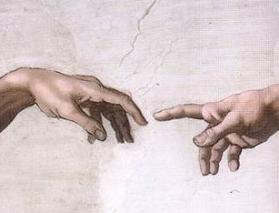
The Apostle Paul declares, “…when the fullness of time had come, God sent forth his Son, born of woman, born under the law” (Galatians 4:4; ESV). Beyond his immediate argument in Galatians 4, such fullness of time no doubt included for Paul Jesus being born a Palestinian Jew under Roman rule. One of the items I take from this intersection is that the import of historical fact for the Jewish community and the significance of eternal myth for the Greco-Roman civilization (and Eastern and Middle-Eastern cultures, too) meet in Jesus’ life, including his resurrection from the dead.
For C.S. Lewis, the ageless myth of the ancient world becomes historical fact in Jesus’ person:
The heart of Christianity is a myth which is also a fact. The old myth of the Dying God, without ceasing to be myth, comes down from the heaven of legend and imagination to the earth of history. It happens — at a particular date, in a particular place, followed by definable historical consequences. We pass from a Balder or an Osiris, dying nobody knows when or where, to a historical Person crucified (it is all in order) under Pontius Pilate. By becoming fact it does not cease to be myth: that is the miracle.[1]
All too often, we take the mythical to be devoid of real historical concern, even if there are some historical elements. The Oedipus Rex story takes place in one way or another throughout history, and is not isolated to the one account by Sophocles. From the flip side, we often take the historical to be absent of any eternal merit. It may have been significant that Napoleon and his army crossed the Alps in 1800, but we need not surrender our lives in the twenty-first century to this or any other event from Napoleon’s life (though his soldiers and other subjects certainly did).
The Bible places far weightier significance on its own historical accounts. Jewish people took to heart the claim that the eternal God enters history in his engagement of Israel. Christianity builds on that claim and asserts that the God of Israel became human in history as Jesus of Nazareth. Jesus’ story is particular and concrete as well as universal and mysterious at the same time. Indeed, every aspect of Jesus’ history involves the numinous or awe-inspiring quality of myth, along with its universal import. We must account for Jesus—the myth become fact, sensing his call on our lives. As Bruce W. Young puts it in an article titled “Lewis on the Gospels as True Myth,”
We will not read the Gospels lightly as either interesting but distant historical accounts or mere collections of reasonable advice or exemplary tales. There is something in the Gospels of profound and even cosmic importance, something woven into the fabric of our souls and underlying the very structure of the universe. The awe and reverence that myth inspires us to feel is properly directed toward God.
‘The God who comes down to die’ theme is present in ancient paganism and the gospels. As with the fertility cult tales, there is death, but the god or God also comes to life to renew or transform.[2]
We are wired to anticipate and hope for such transformation from life to death to life again. The death and renewal story resides deep in our imaginations in some primal manner. And yet, for Paul and for Lewis, it really does happen in history, and not simply in our dreams and deep longings. The hope for transformation through the divine descent to death and resurrection really does occur in history on Good Friday and Easter. No wonder it is a Jew in whom this miracle occurs, for the Jews look for miraculous signs in history, whereas the Greeks look for wisdom, as Paul reasons in 1 Corinthians 1. And no wonder, Jesus had to rise from the dead. For the worldwide myths, while resurrection was imaginatively important and universal, it was not historically necessary. For the Jewish faith, history mattered, so something like a resurrection would be necessary on Paul’s view to confirm Jesus’ historical and particular claim that he is God descended to earth (1 Corinthians 1 and 15) rather than a foolish and godless blasphemer. Wolfhart Pannenberg speaks to this matter:
Jesus’ claim to authority, through which he put himself in God’s place, was…blasphemous for Jewish ears. Because of this, Jesus was then also slandered by the Jews before the Roman governor as a rebel. If Jesus really has been raised, this claim [of putting himself in God’s place] has been visibly and unambiguously confirmed by the God of Israel, who was allegedly blasphemed by Jesus. This [act of resurrection] was done by Israel’s God. A Jew … could certainly not take an event of this kind as one that came to be apart from the will of his God. That the primitive Christian proclamation in fact understood Jesus’ resurrection from the dead as the confirmation of his pre-Easter claim emerges above all in the speeches in Acts [2:36; 3:`5; 5:30f; et al].[3]
As Christians consider the transformation that is alive to the world today through Jesus’ resurrection, see to it that we do not consider it simply a timeless tale of universal import for how we reimagine our existence, or a particular event from the pages of history that remains remote with no bearing on our daily lives. The numinous and universal story of God becoming human, dying and rising again in history should quicken and expand our imaginations and transform our daily existence. As Paul writes, “Therefore, if anyone is in Christ, he is a new creation. The old has passed away; behold, the new has come” (2 Corinthians 5:17; ESV). The myth has indeed become fact on Easter.
Now we must live out daily what we are already cosmically wired to be—new creations in Christ Jesus. We must no longer look at others merely as mortals, but as those who are called to live in and through Jesus Christ (2 Corinthians 5:16-17). Nor should we operate as those who live to eat, drink and be merry for tomorrow we die (1 Corinthians 15:32). We must set our hearts and minds on things above where Christ is seated rather on this life that is perishing, putting away all carnality and putting on the pure affection and character of Jesus Christ (Colossians 3:1-17). We must no longer clutch onto this life with its materialistic charm. Rather, may we lay it down in service for others, including our enemies, as the Lord laid down his life for us when we were still his enemies (Romans 5:10). After all, our destiny belongs to the new cosmic order that shapes every person’s destiny (Philippians 2:9-11), whether they are conscious of it or not here and now. As Paul proclaims to the Athenians at Mars Hill,
“Being then God’s offspring, we ought not to think that the divine being is like gold or silver or stone, an image formed by the art and imagination of man. The times of ignorance God overlooked, but now he commands all people everywhere to repent, because he has fixed a day on which he will judge the world in righteousness by a man whom he has appointed; and of this he has given assurance to all by raising him from the dead.”
Now when they heard of the resurrection of the dead, some mocked. But others said, “We will hear you again about this” (Acts 17:29-32; ESV).
May we not scoff at Paul’s teaching or relegate the story of Jesus Christ to some ancient mythology or history textbook. May the myth that became historical fact make a factual difference in our lives today.
[1]C. S. Lewis, “Myth Became Fact” in God in the Dock: Essays on Theology and Ethics (Grand Rapids: Eerdmans, 1970), pages 66-67. For a discussion by C. S. Lewis on myth, see his chapter “On Myth,” in An Experiment in Criticism (Cambridge: Cambridge University Press, 1961), especially pages 42-44. Refer also to cslewis.com.
[2]For a discussion on the fertility cult myths, see the classic work by James George Frazer, The Golden Bough: A Study in Magic and Religion: A New Abridgement from the Second and Third Editions, Oxford World’s Classics (Oxford: Oxford University Press, 2009).
[3]Wolfhart Pannenberg, Jesus: God and Man, 2nd ed., trans. Lewis L. Wilkins and Duane A. Priebe (Philadelphia: The Westminster Press, 1977), pages 67-68.















